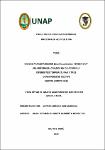Índices parasitarios en Brochis splendens “green cat” (siluriformes) criados en cautiverio a diferentes temperaturas y tres densidades de cultivo Iquitos Loreto 2020
Abstract
The present study determined the parasite indices in Brochis splendens "Green Cat" subjected to different temperatures and three culture densities. The fish were collected from artisanal collection centers near the Nanay River, the same ones that were transferred to the Laboratory of Parasitology and Aquaculture Health of the Fernando Alcántara Bocanegra Research Center (CIFAB) of the Peruvian Amazon Research Institute (IIAP), where they were carried out the experimental phase. The experimental units consisted of a total of 18 rectangular glass tanks, each one provided with a thermostat to regulate the temperature. The temperature levels were between 28 30 °C and 31–33 °C and the culture density of 1 fish/L, 2 fish/L and 3 fish/L of water respectively. The fish were subjected to the experiment for 10 days, then they were sacrificed to determine the influence of the factors on the parasite load of ectoparasites and endoparasites. The results revealed a marked influence of temperature and density on the parasitic indices of the ectoparasites, but not on the parasitic indices of the endoparasites. Treatments with temperatures of 31-33°C and with a density of 3 fish/L had a greater abundance of ectoparasites belonging to Gyrodactylidae and Dactylogyridae. The ectoparasite species identified corresponded to two gyrodactylideos recorded on the skin: Gyrodactylus sp. n.1 and Gyrodactylus sp. no. 2, considered new species not yet described, two dactylogyrídeos: Philocorydoras peruensis and P. maltai recorded in the gills, three endoparasites corresponding to two trematodes: Genarchella genarchella and Dadayius peruensis collected from the intestine and one nematode: Procamallanus (Spirocamallanu) pintoi also recorded in the intestine. El presente estudio determinó los índices parasitarios en Brochis splendens “green cat” sometidos a diferentes temperaturas y tres densidades de cultivo. Los peces fueron colectados de centros de acopios artesanales cercanos al río Nanay, los mismos que fueron trasladados al Laboratorio de Parasitología y Sanidad Acuícola del Centro de Investigaciones Fernando Alcántara Bocanegra (CIFAB) del Instituto de Investigaciones de la Amazonía Peruana (IIAP), donde se realizó la fase experimental. Las unidades experimentales estuvieron constituidas por un total de 18 peceras rectangulares de vidrio, cada una provista de un termostato para regular la temperatura. Los niveles de temperatura fueron entre 28–30 °C y 31–33 °C y la densidad de cultivo de 1 pez/L, 2 peces/L y 3 peces/L de agua respectivamente. Los peces fueron sometidos al experimento por 10 días, luego fueron sacrificados para determinar la influencia de los factores en la carga parasitaria de ectoparásitos y endoparásitos. Los resultados revelaron una marcada influencia de la temperatura y la densidad en los índices parasitarios de los ectoparásitos, mas no en los índices parasitarios de los endoparásitos. Tratamientos con temperaturas de 31-33°C y con densidad de 3 peces/L, tuvieron mayor abundancia de ectoparásitos pertenecientes a Gyrodactylidae y Dactylogyridae. Las especies de ectoparásitos identificados correspondieron a dos Gyrodactilídeos registrados en la piel: Gyrodactylus sp. n.1 y Gyrodactylus sp. n. 2, consideradas especies nuevas aún no descritas, dos Dactylogyrídeos: Philocorydoras peruensis y P. maltai registradas en las branquias, tres endoparásitos correspondientes a dos Tremátodos: Genarchella genarchella y Dadayius peruensis colectados del intestino y un Nemátodo: Procamallanus (Spirocamallanus) pintoi registrado también en el intestino.
Collections
- Tesis [12]


